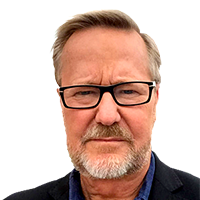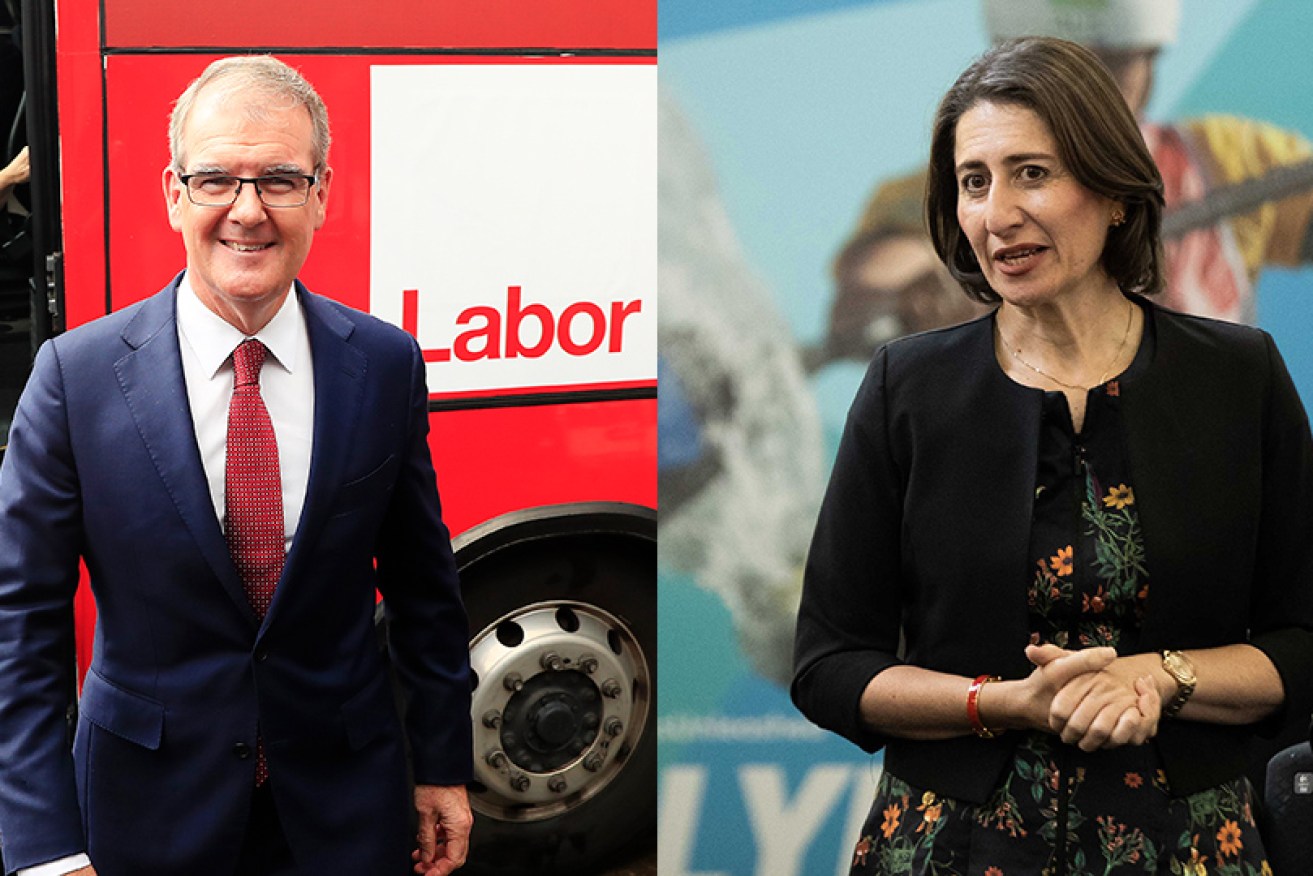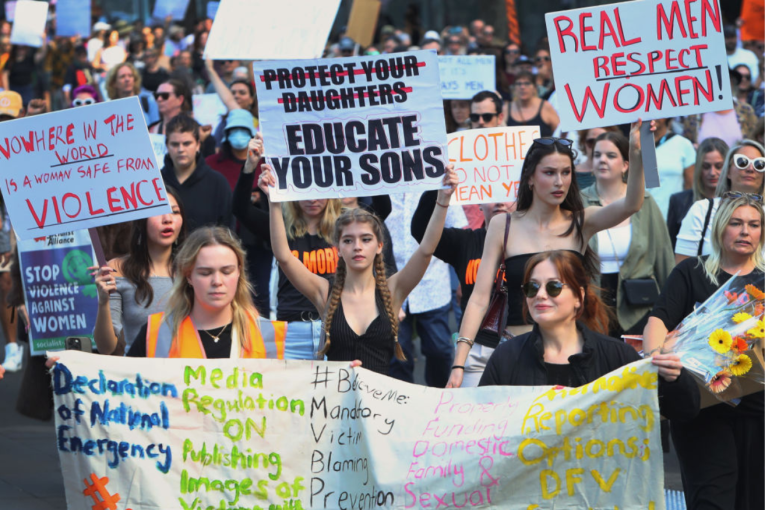Get Daley: NSW Coalition goes all out to make Labor leader its bogeyman


There is more to the NSW election result than choosing Michael Daley or Gladys Berejiklian as premier. Photos: Getty
The Gladys Berejiklian Coalition government in New South Wales has mounted a no-holds-barred blitz against Labor’s new leader Michael Daley to try to hold power in Saturday’s state election.
Prime time TV ads have taken the risky step of profiling Mr Daley, who was relatively unknown until three weeks ago. The ads used an unflattering photo of Mr Daley with dire warnings of debt, deficit and cancelled infrastructure projects : “You’ll pay for it Daley”.
The blitz was necessary, Liberal strategists told The New Daily, because the party’s qualitative research had shown Mr Daley had established a political momentum from the moment he threatened to sack shock jock Alan Jones from the Sydney Cricket Ground Trust board.
Live on Mr Jones’ 2GB program, Mr Daley was highlighting Labor policy of saving the Allianz football stadium from demolition as “emblematic’ of the Berejiklian government’s misdirected infrastructure programs, saying schools, TAFE and hospital funding should be top priorities.
The stadium demolition was underway in the last two weeks of the election campaign, with excavators starting to tear down the superstructure.
Ms Berejiklian was forced to stand by the demolition, declaring that her budget management was so sound that, “New South Wales can have it all”.
She rejected a Sydney Morning Herald front page story exposing a consultant’s report that Allianz stadium could be made compliant with modern safety standards for just $18 million instead of the $700 million demolition and reconstruction cost.
In the final week of the campaign a Liberal Party “get Daley” dirt file produced a video in which Mr Daley told a Blue Mountains forum last September that “Asians with PhDs” were moving to take Australian jobs.
Embarrassed by the remark’s racist tone, Mr Daley issued an “unqualified” apology while his Labor campaign director, Kaila Murnain, scrambled to place reassuring ads in all Sydney Chinese language newspapers.
Also called in to the defence in key Labor seats, East Hills, Granville and Auburn, with up to 20 per cent Chinese Australian constituents, were former PMs Paul Keating and Kevin Rudd.
In a mischievous intervention, former SBS newsreader Lee Lin Chin tweeted: “Don’t worry @michaeldaleyMP, I stole an Australian newsreader’s job without a PhD. We will take all the jobs regardless of our education.”
Don’t worry @michaeldaleyMP I stole an Australian newsreaders job without a PhD. We will take all the jobs regardless of our education.
— Lee Lin Chin (@LeeLinChin) 19 March 2019
So concerned about a hung parliament and the possibility of a minority Labor government (with polls consistently showing a 4.3 percent swing to Labor), the Coalition parties called in former prime minister John Howard and former federal Nationals leader Tim Fischer to deliver a message warning about the softening of gun laws.
After the Christchurch gun massacre last week, NSW Labor’s preference deal in key seats with a resurgent Shooters, Fishers and Farmers Party became highly contentious.
The “unholy” Labor-Shooters alliance has already been used to destabilise the Nationals in a recent Orange by-election where for the first time the Shooters were able to wrest the seat from the Nationals with the help of Labor preferences.
Confronted with claims of expediency and cynicism behind this tactic, Mr Daley was forced to declare he would resign from the NSW “bearpit” if ever the parliament weakened the state’s gun laws.
By week’s end Liberal strategists were satisfied they had done their best to confront the Daley momentum.
Mr Daley’s inability to recall funding numbers at a Sky News-Daily Telegraph leaders’ debate on Wednesday night had also given voters cause to pause, they believed.
Labor strategists told The New Daily that such was the intensity of the “get Daley” counter attack and its multimillion-dollar ad spend that Labor’s plan of taking majority government on the back of anti-Coalition sentiment now seemed improbable.
Now at stake is a hung parliament, with the Coalition having only to lose six seats to surrender its lower house “bearpit” majority.
The Coalition’s biggest vulnerability remains a swag of Nationals’ marginal seats. The distressing impact of the drought has focused minds in the bush – especially on the Sydney-centric spend on infrastructure and stadiums – with the polls showing support for incumbent Nationals MPs has been hit hard.
While Labor will benefit in some seats from “white hot” anger at the Nationals, the biggest beneficiaries are considered to be the Shooters and One Nation.
One Nation is now a registered political party in NSW, with Pauline Hanson recruiting former federal Labor leader Mark Latham as state leader and heading the party’s upper house ticket.
The Nationals are considered at risk in Lismore, Upper Hunter, Monaro, Tweed, Murray, even the once safe seats of Barwon and Dubbo.
To hold power in NSW in minority government, Premier Berejiklian will have to produce the signatures of 47 MPs, including compatible cross bench members, to demonstrate to His Excellency, NSW Governor David Hurley, that she can command confidence in the bearpit.
Also at stake in this election is the future of Prime Minister Scott Morrison, a New South Welshman, who faces the toughest of re-election challenges in the coming federal election expected in May.
If the Berejiklian government retains power in NSW, even as a minority government, Mr Morrison will emerge as more politically competitive against Labor’s Bill Shorten in the federal poll.
Mr Morrison has brought forward the federal budget to April 2 to announce a return to surplus, plus an economic stimulus package in the form of personal income tax cuts – a strategy aimed to divert the attention of voters angered by the recent beheading of Malcolm Turnbull as prime minister.
Quentin Dempster is a Walkley Award-winning journalist, author and broadcaster. He is a veteran of the ABC newsroom. He was awarded an Order of Australia in 1992 for services to journalism.








